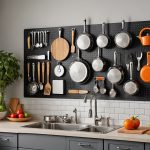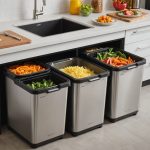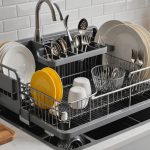Benefits of Water Filtration
The benefits of water filtration are numerous, offering both immediate and long-term advantages for your home and health. One of the most noticeable improvements is in the taste and odor of water. Filtering water can remove chlorine and other unpleasant substances, significantly enhancing its flavour and making it more enjoyable to drink.
In terms of health, filtering out contaminants such as lead, mercury, and certain bacteria can greatly reduce health risks associated with drinking unfiltered water. By eliminating these harmful elements, water filtration offers significant health advantages, contributing to safer and cleaner water consumption.
Also read : Unleashing the benefits: transform your kitchen design with recycled materials
Furthermore, consistent use of filtered water supports kitchen wellness by preventing scale build-up in appliances that use water, like kettles and coffee makers, thus prolonging their lifespan. In the long run, consuming filtered water contributes to overall wellness, as it encourages proper hydration and supports the body’s natural functions. By investing in a water filtration system, you are not only enhancing the quality of your water but also supporting a healthier lifestyle.
Understanding Different Water Filtration Systems
Choosing the right water filtration system can significantly impact the quality of your water. Various types of water filtration systems are available, each employing different filtration methods. Common systems include:
Have you seen this : Window sill wonders: your ultimate guide to growing a thriving herb garden in miniature greens
-
Carbon Filters: These are popular due to their effectiveness in removing chlorine and improving taste.
-
Reverse Osmosis: Known for their ability to eliminate a broad spectrum of contaminants, including salts and nitrates.
-
UV Purifiers: Effective for disinfecting water by killing bacteria and viruses.
When comparing these methods, consider their effectiveness and suitability based on water source and contaminant levels. For instance, reverse osmosis systems are highly effective but may be overkill for water with basic chlorination issues that a carbon filter can handle.
Considerations for selecting the right system should include water quality concerns, installation ease, and maintenance requirements. By assessing these factors, you can find a system that fits your kitchen’s needs without compromise. Informed choices ensure not just improved water taste but also prolonged appliance life and health safety.
Step-by-Step Installation Guide
Efficient water filter installation ensures your system operates effectively. This guide provides a clear, DIY approach for setting up your kitchen’s water filtration system.
Preparing for Installation
Start by gathering necessary tools and materials such as wrenches, tubing cutters, and the filter system components. Before proceeding, assess your kitchen’s plumbing to ensure compatibility with the filter type. This assessment can prevent installation snags and ensure a smooth process.
Installing Under-Sink Filters
Begin by turning off the water supply and draining the lines to prevent leaks. Attach the mounting bracket under the sink and connect the filter to the cold water line, ensuring all connections are secure. Use Teflon tape to prevent leaks at fittings. Pay attention to the flow direction marked on the filter to avoid reverse water flow. Common mistakes include improper tightening and neglecting to check for leaks.
Installing Countertop or Pitcher Filters
Countertop systems typically require attachment to the faucet via an adapter. Ensure the adapter fits securely to avoid water migration. For pitcher filters, regular cleaning of the reservoir and following replacement schedules maintain performance. Consider filter longevity and maintain consistency in care to optimize your filtration system’s efficiency.
Maintenance of Water Filtration Systems
Regular filter maintenance is crucial to ensure your water filtration system functions optimally. Changing filters at the intervals recommended by the manufacturer keeps the system in prime condition. Ignoring this can lead to reduced performance and could allow contaminants to pass through.
System longevity is directly tied to maintenance. Signs that indicate a need for system upkeep include decreased water flow and unusual tastes or odours. Monitoring these aspects helps in identifying issues early, preventing potential damage or health risks.
To prolong the life of your water filtration system, conduct frequent performance checks. This includes inspecting connections for leaks and ensuring the system is free from blockages. Implementing a regular cleaning schedule is also beneficial, especially for systems like reverse osmosis, where membrane fouling can occur.
By understanding the importance of routine filter maintenance, you ensure your system not only delivers the highest water quality but also enhances kitchen wellness and health. Efficient care leads to extended system lifespan and sustained health advantages from consuming effectively filtered water.
Recommended Water Filtration Products
Choosing the best water filters requires understanding their features and benefits. Highly rated systems include models from Berkey, Brita, and Aquasana, known for effectiveness and reliability. Each offers unique advantages suited for different consumer needs.
For superior contaminant removal, Berkey’s gravity-fed systems excel, especially in areas with uncertain water quality. Their durability makes them a worthwhile investment for long-term use. Brita’s affordable pitcher filters are ideal for smaller households, prioritising convenience and ease of use. They provide effective chlorine reduction, enhancing taste and odour.
Aquasana systems, particularly their reverse osmosis units, deliver comprehensive filtration by targeting a wide range of impurities. This option suits consumers prioritising complete purification but requires more regular maintenance.
When selecting a filtration product, balance budget and performance. Consider the frequency of filter changes, ease of installation, and customer reviews. It’s vital to align the filtration system with your specific water quality concerns and usage patterns for the best results. Investing in a suitable water filter not only addresses immediate health advantages but supports long-term wellness and satisfaction.
Addressing Common Concerns and FAQs
When it comes to water filtration, several questions and concerns often arise. A common misconception is that water filtration isn’t necessary if your water is municipally treated. However, filtration enhances water quality by removing residual contaminants, improving overall health and taste.
FAQs and Troubleshooting
-
Is water filtration beneficial for health?
Absolutely, health advantages include the removal of harmful substances like lead and bacteria, contributing to safer drinking water. Filtration can prevent many associated health risks.
-
What if I’m facing installation issues?
Troubleshooting involves checking all connectors and ensuring you’ve followed the DIY installation guide precisely. Ensure that there’s no blockage in the system and that filters fit snugly.
-
How often should I replace filters?
Regular filter maintenance is crucial. Replace them at intervals recommended by manufacturers to maintain system effectiveness. Signs of a failing filter include reduced flow and altered taste.
Engaging with these FAQs helps demystify filtration systems and reinforce their necessity, ensuring consumers make informed choices for their kitchen’s wellness and sustainable health benefits.











